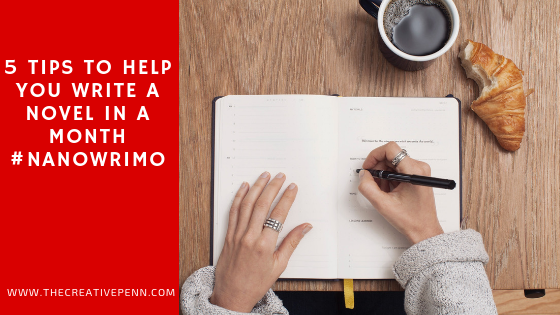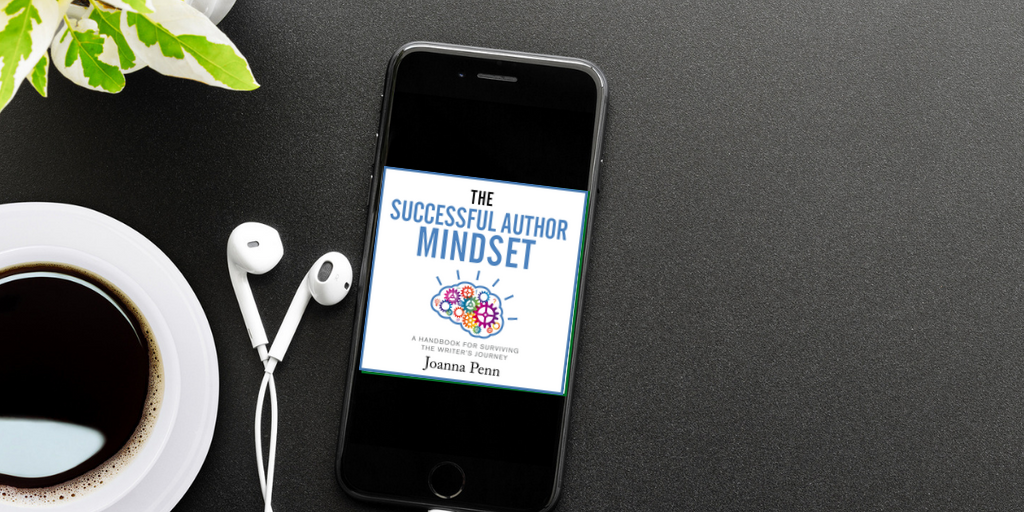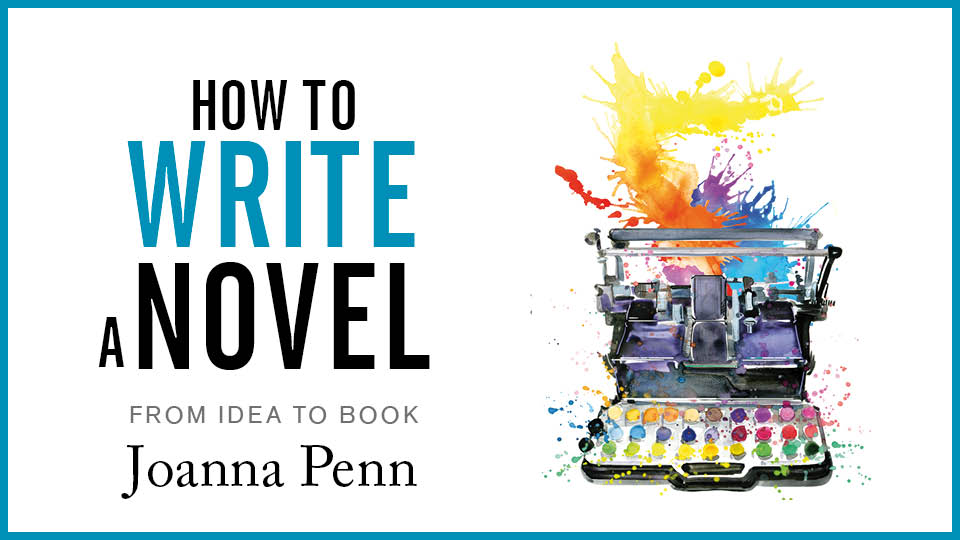At this point, I’ve written 17 novels and I’m about to write the first draft of my next one during NaNoWriMo, National Novel Writing Month, when writers all over the world try to write 50K words during November. Of course, if you’re reading this at another time, no worries! You can still use these tips for your writing project.
If you’re getting ready to write your first or next novel, here are 5 tips to help you get that first draft written.

You can listen to this episode on the special Kobo Writing Life Podcast episode below or on your favorite podcast app.
Special NaNoWriMo promotion 50% off my books for authors on Kobo:
You can get my Writer’s Toolbox which includes The Successful Author Mindset, How to Market a Book, and How to Make a Living with your Writing or/ you can also get The Successful Author Mindset in audio format. Get 50% off at checkout with discount code: KWLPODPENN [Available 25 Oct – 30 Nov 2019]
(1) Know what you’re going to write before you write it
For NaNoWriMo, you start writing on 1 November, but you can plan your novel before you start to write it. If you’re writing in a series, perhaps you already have your world sorted, and characters in mind, so you just need a plot. If you’re starting from scratch, then it’s likely you have some idea in mind, so start writing notes.
I’m a discovery writer, or ‘pantser,’ so I don’t outline in advance, but I always have an imagined character before I start a book, and an opening scene. I might also have notes from research or other thoughts.
Wherever you’re at on your author journey, make sure you spend some time thinking about your story before sitting down on that first day to write.
One of the most important things to decide is your genre and this is a tough question for any author to consider. I’d suggesting writing in the genre you love to read and if you don’t know what that is, look up a book that’s similar to the one you’re intending to write and check its category on Amazon. Is it a thriller, a romance, historical fiction, YA, horror?
It’s good to have an idea of what you’re writing as this will help with characters, plot ideas and where you’re heading in terms of an ending. For example, romance readers love a happy ever after, but thriller readers appreciate a battle to the death and the triumph of the heroine at the end of the world.
(2) Keep it simple
Maybe you want to write a multi-character epic set across a universe of worlds … Fantastic! But maybe don’t choose that goal for your NaNoWriMo project. Make it easy on yourself and use a basic structure for your story.
First, put a character in a setting. To use The Hunger Games as an example, Katniss lives in Panem, working to feed her family in an oppressed district. If you’re a new writer, keep your story simple and pick one primary character, then write from their point of view. The more characters you have, the more complicated your book, so try to stay focused on one protagonist — although of course, there will be other minor characters.
Then, come up with something that disrupts the character’s existing life. Katniss wants to save her sister from the Reaping and volunteers to take her place.
Then, give the character something they want to achieve and put lots of obstacles in place to stop them achieving it. Katniss wants to stay alive and win The Hunger Games, but increasingly, she also wants to tear down the existing system of Panem. She faces obstacles in the challenges that the games present, the other Tributes who are trying to kill her, as well as President Snow and the whole corrupt system, plus her own internal battles.
Finally, build to an ending that satisfies readers of the genre. I’m sure you read a lot of books so you will know what you love in stories. Bring elements of that into your ending. Of course, if you’re a discovery writer like me, you might not know your ending until well into the writing process!
You will need to flesh out each of these elements as you write, but try to keep it simple with one main character point of view and you will achieve your goal of finishing a story.
If you need more help with writing a novel, check out my course for writers, How to Write a Novel: From Idea to Book.
(3) Schedule your writing time and make the most of it
Writing 50,000 words in a month is an ambitious goal and the only way to achieve it is to schedule your time. I use Google Calendar to block out chunks of time to write but you can use whatever works for you — as long as you schedule it and then show up for that time.
You can’t write a novel in ‘spare moments,’ because no one ever has any spare moments! You need to rearrange your life in order to get your writing done. That might mean getting up an hour earlier, or taking a lunch break and going to a cafe or the library to write, or skipping Netflix after dinner. It might mean asking your family to do the chores or just leaving things to pile up for longer than you usually would. It might mean telling your friends that you won’t be going out much in November and using your weekends to create.
If you’re struggling to find the time, well, how much do you really want this?
We all have to give up something to achieve our goals.
Once you have your writing time locked in, then turn up and do the work. That means writing words on a page. They are unlikely to be great words, but that’s OK, just get them down. This is the first draft, so tell your inner editor to come back next month, but for now, you are creating.
Find somewhere you won’t be disturbed and set a timer. Don’t do anything else in that time but write. Join some of the NaNoWriMo community writing sprints, or find a writing group in your city, then go and actually write, not talk about writing! I go to my local cafe at 7am before the rush so I can get a table for a few hours. I buy my coffee, put on my noise-canceling headphones and push play on my Rain and Thunderstorms album. Then I write.
(4) Use effective tools but don’t use them to procrastinate
There are many writing and productivity tools these days and copious apps that say they can help you get more done. If you find some that work for you, then fantastic, but don’t use them as an excuse to procrastinate.
For example, I have now written 29 books using Scrivener. It is the secret weapon of many successful writers because it’s so good at helping you organise your manuscript. Once you know how to use it effectively, you will never go back to using MS Word, but maybe don’t try to learn during your month of writing. You need that time to create, so learn it beforehand or later on. [If you want to learn how to use Scrivener, check out Learn Scrivener Fast.]
Another secret weapon for prolific writers is using dictation, but again, it’s hard to start dictating on day 1 when you’re not used to using it.
In terms of timed writing, there are lots of methods and special apps, but seriously, just set your phone to 20 minutes and write.
If you find yourself struggling to concentrate, then give yourself a periodic procrastination break. For example, in a two-hour writing session, I will get up for more coffee, have a stretch, check Twitter and Insta and the news and then sit down for the next session. If you find this break going over ten minutes, give yourself some tough love. Get back in the chair!
(5) Acknowledge your self-doubt and fear — and get back to the blank page
Even after so many books, I find it a daunting prospect to go back to the blank page — it’s exciting but also scary! What if I don’t have any ideas? What if I get writer’s block? What if I can write words but they are just really bad? What if someone reads my work and thinks I’m crazy or stupid? What if this is all a waste of time? There are so many brilliant writers so why am I even trying?
Don’t worry. You are not alone. All these thoughts are normal. The creative process is a rollercoaster of emotion and experience, and it doesn’t stop after the first book, you just know to expect it!

I suffer from self-doubt as much as the next writer, but I know that once I sit down at my laptop and start to type, a story will emerge and over repeated writing sessions it will turn into whatever it is meant to turn into, and then I will edit it and work with professionals and it will emerge into the world at some point. You just have to balance the curious mystical process of creation with the actual work of sitting down at the page and typing.
If you need more help with these mindset issues, then check out my book The Successful Author Mindset, available on Kobo in ebook and audiobook formats. You can use promo code KWLPODPENN to get 50% off the audiobook in November 2019.
Your next steps: This is just a first draft!
Remember, whatever you write during NaNoWriMo is just a first draft and if you made it to 50,000 words, then you still have a process to follow to turn that into a finished book. We don’t have enough time to go into the editing process in this special podcast episode, but have a listen to the backlist of the Kobo Writing Life Podcast and you’ll hear tips from lots of writers on their writing process, as well as publishing and book marketing tips.
Happy writing!
Are you doing NaNoWriMo? Do you have tips to share? Please leave a comment and join the conversation.
Top image: Photo by Cathryn Lavery on Unsplash

